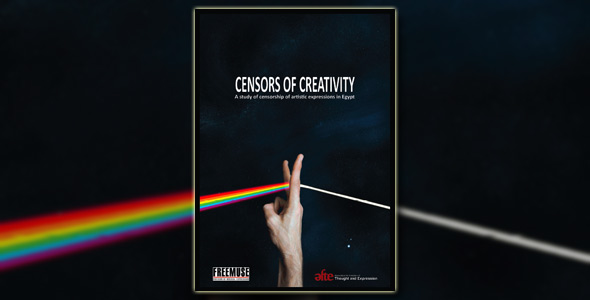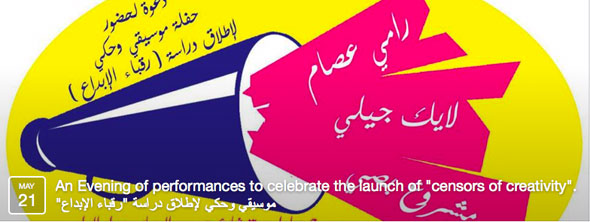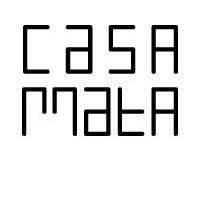Study on censorship of artistic expression in Egypt published by AFTE and Freemuse
AFTE and Freemuse publish an extensive study on censorship of artistic expression in Egypt. The 84-page report ‘Censors of Creativity’ reveals that the Egyptian government needs to reform the current legislative and institutional apparatus of censorship.

“Several conservative restrictions imposed on artistic creativity contravene human rights standards and basic liberties,” says Ahmed Ezzat, the Egyptian human rights lawyer, who – as director of the AFTE legal unit – led a team of researchers and wrote the final report.
According to the study, despite the passing of successive regimes and governments, a common political will persists that rejects artistic freedom – ostensibly to protect the public order, public morals, and the higher interests of the state – without consideration for the catastrophic impact that censorship has had on the development of culture in Egypt, both in terms of the restrictions on artistic freedom and the repercussions for the culture industry.
“Egypt has developed a non-transparent, expensive, bureaucratic labyrinth of censorship mechanisms, which is highly damaging for artistic creativity,” says Executive Director Ole Reitov from Freemuse.

Testimonies
The study recommends the Egyptian government should abolish pre-censorship and allow artists to organise freely. ‘Censors of Creativity’ includes testimonies from artists, who experience complex censorship practices in their daily work. In the study, film maker Ahmad Abdalla explains:
“In general, the form of permits is intentionally incapacitating, even if the censor approves the film. For example, you submit the script and it’s approved and passes the censors. They write on it: ‘The film has been approved by the art works authority’, with the final opinion of the censor to come after a viewing of the film. So this approval has no value until after the film is seen.” And then the censors add observations like the following:
‘1. No mention of the police or army, on active duty or inactive, in any way whatsoever.
2. Avoid scenes of smoking, water pipes, and drugs.
3. Avoid dealing with clerics in any way whatsoever.’
Ahmed Abdalla has spent endless hourd discussing with censors and authorities:
“In the end, following these observations, you can’t even show a chase scene between a policeman and a thief, even as just a classic scene with no connection to politics. You can’t. Or you can’t show the hero in a scene praying the Friday prayers, for example. None of these scenes could be put in a movie if you follow the observations from the censor. So your film may have an officer, a mosque, or a church, and the script with these things has been approved, but these observations actually prohibit it. The idea is that they’re immunizing themselves in case something happens later, so they can argue that they gave you these observations. They’re civil servants who are protecting themselves and aren’t interested in creative work and how to direct movies”
Politics, religion and sex – no thanks
‘Censors of Creativity’ is the first ever study of the numerous Egyptian restrictions, both official and social imposed by mainstream culture, particularly when artistic expressions address one of the three historically controversial topics of politics, religion, and sex.
This study explores the primary legislative and institutional restrictions on freedom of artistic expression in Egypt. It analyzes the legal framework governing the censorship of artistic works and the standards used by the various censorship bodies in the course of their work.
The study provides a number of recommendations to restructure the censorship apparatus and replace it with another system based on different criteria, such as an age – appropriate classification of artistic works that does not infringe on the content of the work or impose a specific point of view on its creator.Using examples and case studies, this study examines cases in which artists were subjected to censorship.
Some artists yielded to the wishes of the censor, while others challenged them and took the matter up with the courts. This study also aims to encourage the authorities to take positive steps to liberate the arts from all forms of paternalistic oversight.
Challenging values
Egypt has been through a very turbulent period since the uprisings against the Mubarak regime. Artistic expressions have exploded, regimes have come and gone, but the legislation and practices of censorship boards have not changed.
‘Censors of Creativity’ explores how historically, art in all its forms played a vital role in challenging values and practices inimical to individual freedom and human rights, which took shape to codify and legitimize repression in all its forms. At times, this repression is explicitly politically motivated, deployed to defend the ruling authority against any criticism aimed at changing it or unveiling their abuse of power.
At other times, repression is manifested as a rejection of sexual relationships that deviate from the socially acceptable norm of a man and a woman bound by the institution of the family. According to censorship laws and regulations, any work of art that portrays other types of relationships, such as homosexual ones, threatens the social and religious values of the Egyptian people and thus is not permitted a public airing.
Sensitive questions about religion
Religion is another red line that, according to censorship laws and regulations, cannot be transgressed by artistic works. In general, Egyptian laws do not guarantee freedom of religious expression, particularly if the work contains some direct or indirect critique of the Abrahamic religions (Islam, Christianity, and Judaism) or raises sensitive questions about widely accepted religious issues.
This has repercussions for artistic expression, throwing up heavy obstacles before works of art that broach issues related to freedom of belief, criticize the Abrahamic religions, or promote a religion not recognized by the state and society.
The Egyptian authorities justify the censorship of works of art that address any of these three topics by citing the need to protect the public order, public morals, and the higher interests of the state.
The legal study forms the background to the AFTE-Freemuse submission to United Nations Universal Periodic Review in March 2014. The Egyptian government will be reviewed in Geneva in October 2014
» Right-click here to download the report (PDF document, 84 pages)
» Open or download summary in Arabic language: على السلطات المصرية أن تُلغي الرقابة على الفنون (Microsoft Word document, 3 pages)
» Read the Freemuse-AFTE UPR submission on Egypt: ‘Universal Periodic Review: Egypt 2014 – Stakeholder submission’ (PDF document, 12 pages)
» Open or download the Freemuse-AFTE UPR submission on Egypt in Arabic language: الاستعراض الدوري الشامل • مصر (Microsoft Word document, 14 pages)
» More information about the UPR submission: freemuse.org/archives/7363 (web page)
Source: Artsfreedom.org








